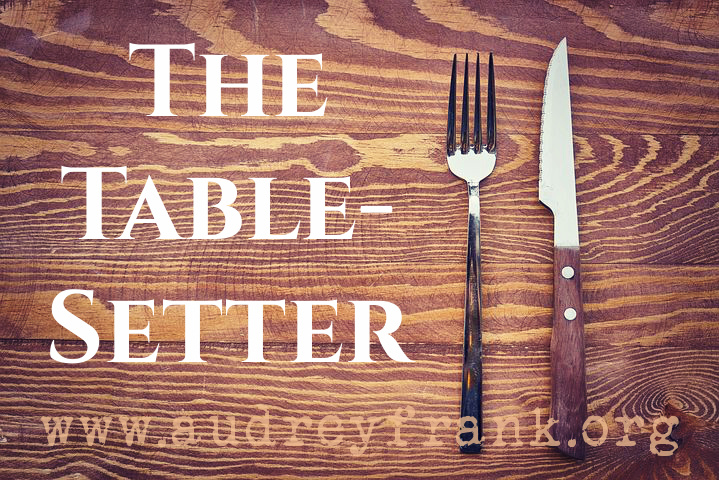The Table-Setter

Thou preparest a shulchan before me in the presence of mine enemies: Thou anointest my head with shemen (olive oil); my kos (cup) runneth over. Surely tov (goodness) and chesed (lovingkindness) shall follow me kol y’mei chaiyyai (all the days of my life)…
–Psalm 23:4-6, Orthodox Jewish Bible
Shulchan: (Hebrew) a king’s table, private use, sacred use (Brown, Driver, Briggs, Gesenius Lexicon; keyed to the “Theological Word Book of the Old Testament”).
My table-setter was very busy.
The most colorful rug, the one woven by her great-grandmother and carefully cherished and preserved, was the one chosen as a “tablecloth” for eating. I watched as Nadia tenderly unrolled it and placed it on her immaculately clean floor in the center of the room. Next, silk embroidered cushions were arranged in a welcoming circle, creating an ambiance of luxury and indulgence. I did not feel our family’s presence was worthy of such finery, such effort. But I dared not speak my reservations aloud for fear of shaming my gracious hostess.
We had been ordered to sit on the cushions and rest while she made her final preparations. The delectable fragrances coming from the small kitchen nearby were exquisite and I hoped my friend could not hear my growling stomach. I had developed a habit of fasting before coming to eat at her house, knowing there would be more food than my stomach could possibly hold. The emptier I was when we sat down, the more I could please my hostess by eating copious amounts of lamb, vegetables, and perfectly ripened fruit. Afterward, we would lay back on the cushions and relax.
The only time I’ve ever done anything close in my home culture is on Thanksgiving Day. And usually in our family, instead of laying down and relaxing, we take a long, strenuous hike to make up for our indulgence.
In North Africa and the Middle East, however, that’s just not how it’s done. My friends taught me to bring my emptiness to the table and be filled. And then, rest without shame. They know how to set a table that fills the empty with strength and allows the weary to rest awhile.
Reminds me of Someone Else.
My God is a Table-Setter, and I have learned to come empty to His table and be filled.
I am still working on the rest part.
In Hebrew, that table is called a shulchan. What I find most intriguing about God’s shulchan spoken of in Psalm 23 is that He prepares it for me in the presence of my enemies. Indeed, my life has proven this truth. In my times of greatest trial, He has set the table with the greatest abundance.
Shulchan appears 62 times in the Old Testament, and of all those uses it is mostly found in Exodus (16 times), describing or referring to the table God instructed to be built for the shewbread in the tabernacle.
The shewbread is very significant in our consideration that God sets a table before us in the presence of our enemies because the shewbread symbolized the entire consecration of Israel to the Lord, and their acceptance of God as their God (M.G. Easton M.A., D.D., Illustrated Bible Dictionary, Third Edition, published by Thomas Nelson, 1897. Public Domain.)
God provides for us as we face attacks from our enemies and all the torment that comes from being persecuted, cast down, hard-pressed on every side (see 2 Cor 4:8-10). And His provision has a beautiful, private, sacred, purpose: to entirely consecrate us to the Lord and bring us to complete acceptance of God as our God.
The trials, the suffering, the persecution in our lives… they lead to consecration when we take our seat at His table.
The deepest tragedies and anguishes of this life can lead us to confusion about God’s character, His will, and His purposes. Paul said it well: we are perplexed, but not in despair (2 Cor 4:8). In our darkest night of agony we may not understand the God we have thus far loved and followed.
We may wrestle with trusting what He might do next, what cost He may exact from us that His glory may be revealed. We may question if we can survive the hand of God. We are perplexed, and we struggle against despair.
I know I did.
The matter of my devotion had been settled long before the pre-dawn hours one morning when I sat twisted by grief, unsure of whether my son would survive till sunrise. I was the Lord’s, and He was at liberty to do whatever He desired with my life, even crush it. And I was not sure if I would live through the pain it would cause.
Maybe you have been there.
I have been there more times than I would have ever thought possible in one life.
As I writhed on my bed, sleepless eyes red and swollen from hours of sobbing, God quietly spread a shulchan before me. The fragrance of the shewbread caused me to look at Him again, my soul hunger exceeding the anger and confusion in me that compelled me to shut Him out and stay distant.
Will you trust me? He asked with quiet strength.
The question was charged with pending action, anticipation, and promise.
I opened my Bible to revisit a passage I had been questioning, a passage promising protection that did not appear to have held true for my boy. A passage I had prayed for him his whole life long.
I was ready to fling my retort to God and demand for the thousandth time why He had not protected my son when I had prayed so sincerely, so full of faith, that He would. I had believed Him and He had, apparently, not come through.
But what my eyes fell on instead was Isaiah 8:17-18.
I will wait for the Lord, who is hiding his face from the descendants of Jacob.
I will put my trust in him.
Here am I, and the children the Lord has given me. We are signs and symbols in Israel from the Lord Almighty, who dwells on Mt. Zion.
After a long moment, I answered His question.
Yes. I will trust You.
Thus I took my first bite of the rich provision the Lord laid out upon His table for me. In that very private, sacred moment, I felt strength begin to rise again in my soul, my mind, and my body. Strength to get up, take a shower, and face the next moment. Sometimes our greatest need in times of suffering is that profound and simple.
The shewbread in the ancient Hebrew tabernacle was also called the “presence bread” (see Exodus 25:30). God’s presence is the provision. The nourishment. The strength. The wisdom. The consecration. The help we need to bring us to complete acceptance of God as our God. Acceptance of the God we do not understand. Acceptance of the God whose sovereignty is complete, without error, regardless of our understanding of the circumstances that afflict us. Acceptance that we can trust Him on our darkest night.
Our God is a Table-Setter. He prepares a table before us in the presence of our enemies. #suffering #encouragement #hope Share on XHe does not promise that we will not be in the presence of our enemies. We may be surrounded on every side. But, as Paul knew well and put in words inspired by the Table-Setter, we will never be alone. God Himself will be with us. We are not abandoned. He holds us. Even as we rage with doubt and questions we think no good Christian should ever ask (but every honest Christian likely will).
Our enemies will not always be present. There is coming a day when we will sit at another table, one prepared for us in another kingdom, the heavenly country of which we are citizens through Jesus’ blood.
No enemy will be present then. Only those who accepted the King’s invitation, seated in the glorious presence of our King and our God.
Jesus spoke to them again in parables, saying: “The kingdom of heaven is like a king who prepared a wedding banquet for his son” (Matthew 22:1-2).
Have you accepted His invitation?
Come to the table that He’s prepared for you today.
Lord, thank you for preparing a table before me in the presence of my enemies. Amen.
If this topic has stirred your heart, reach out to me at audrey@audreyfrank.org. I would love to take your hand and come to the table with you.

No Comments